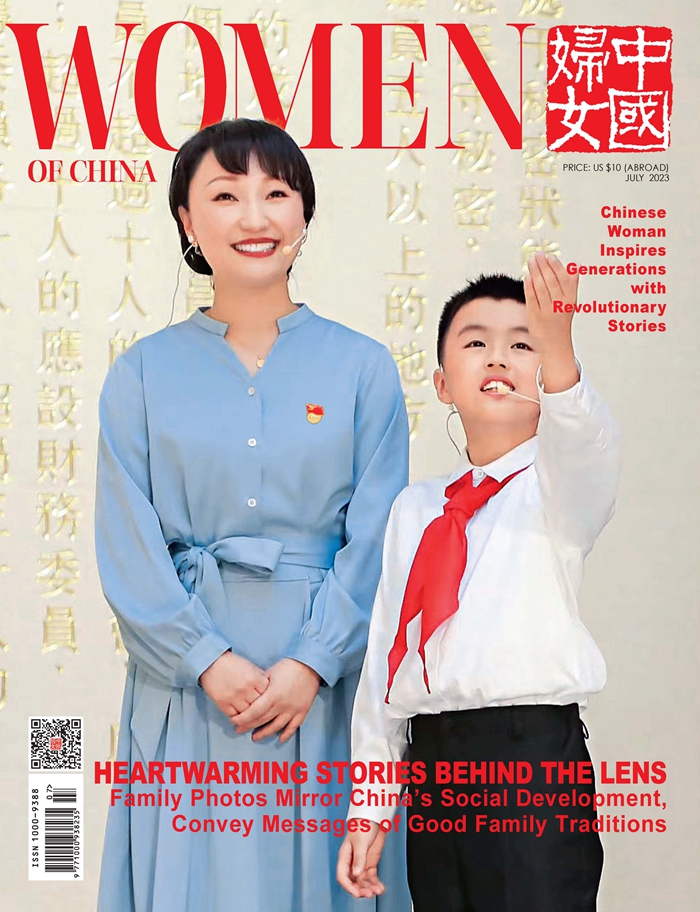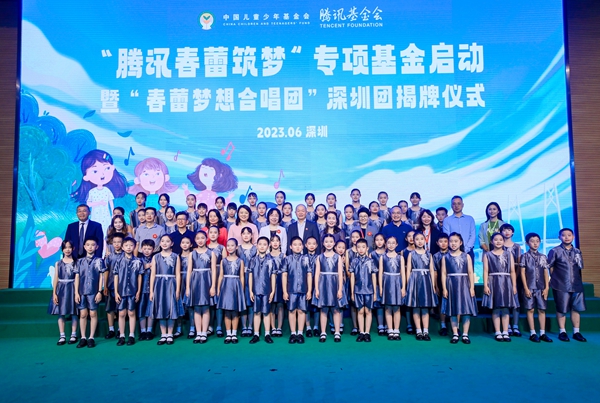In a Class of Her Own
Her classmates were surprised. Wang Xinxin was quiet, shy and, well, almost predictable, especially at school mealtime. The 15-year-old student at Hanji Junior Middle School in Linxia County of Linxia Hui Autonomous Prefecture, Northwest China's Gansu Province, seemed to always buy two steamed buns every dinner. But one day she chose a plate of rice topped with meat and vegetables.
The change, and small celebration, came after Xinxin had a pre-meal talk with teacher Li Wenjun, a volunteer from Lanzhou, provincial capital of Gansu.
As one of four children from a poor family, she didn't get much attention from her parents who were busy making a living. Consequently, she withdrew into herself. On the day she treated herself to a bigger meal, she had actually failed an exam and got a call to visit Li's office. Li, instead of blaming her, asked her tenderly if she was too tired and about her family situation, then comforted and encouraged her.
"I cried and unleashed my feelings," Xinxin recalls. "I was so happy that someone still believed in me, in my value and respected me such, that I thought I too, like others, deserve some better food and to be cared for."
Xinxin was among many students Li paid extra attention to during her stay at the school.
The 34-year-old volunteer from a middle school in Lanzhou served as a temporary Chinese teacher at the Hanji school from March 2019 to July 2020.
She invested a great deal of effort into helping them, garnering widespread praise when she left, and was awarded as "an advanced individual of education and teaching quality of Linxia County in 2019".
Li went to the school after she applied to participate in an education aid project that sends volunteers to work as short-term teachers at schools in poverty-stricken regions. Li thought she was "lucky" since the place she went to was not that poor, at least "we are not short of water or electricity".
As a large-scale junior middle school in Linxia, Hanji school boasts nearly 30 classes per grade, and the three grades combined have more than 5,600 students. Of these, 3,800 are boarders.
Li tried to build good relations with the two classes of students assigned to her, but the majority failed to hand in their homework, or be attentive in her class. She knew she had a struggle on her hands but was determined to make it work.
After talking with students, Li got to know that more than 60 percent of them were from the Hui ethnic group. Their families, traditionally, were in the low-income bracket and work and payment often took priority over education.
"Students seemed to lack the motivation to study," Li says.
Li found that the students didn't have the solid foundation that primary school should have given them and she became depressed during the first semester. On top of this, the students and the school were recipients of financial aid from the authorities and it seemed a shame, she says, to see opportunities not taken.
"I have worked as a teacher for nearly 10 years, but never met such a situation. I just didn't know upon which aspect I should concentrate in order to help them," she recalls.
Li was determined to make a difference. "I thought that since I came to the school, if I could make some changes, no matter how minor, my stay would be worthwhile," says Li.
She prepared a small notebook, talked with the students one by one like friends and noted down information about their situations. Her frankness soon opened the door to students' hearts, and often both Li and her students became emotional during the hourlong talks.
She found many of them were left-behind children whose parents migrated for work, while some had seen their parents get divorced. She tried to give them more care by talking with them frequently and helping them face their difficulties and solve their problems.
Devotion Works
Her encouragement seemed to work wonders. Even more students began to hand in their homework, and studied much harder than before, as they didn't want to "let their favorite teacher down".For instance, some pointed out that no teacher had ever cared about where they had dinner during the weekends.
Li says she believes in the strength of "the devoted style of teaching and schooling". "Compared with knowledge, the students are more eager for an emotional connection and the feeling of being cared for," says Li.
Guo Yanhong, a student of Li, came to her office almost every day and asked Li to check his homework or explain problems. Sometimes he even seemed to be quite happy if Li criticized him for making mistakes.
By talking to Guo, Li got to know his mother had left home when he was young, and his father migrated to faraway places for work, leaving the boy at home to live on the money his father transferred to him regularly.
One day, when Li was examining Guo's homework, she saw a wound on his hand, and reminded him to dress it to prevent infection. Her caring words hit Guo hard. He later wrote in an essay that he turned around and burst into a flood of tears upon hearing Li's words.
"After reading his composition, I thought it was too exaggerated. How can someone be moved so much by such simple words? So I reminded my students not to fake emotions in their compositions and that they need to express their true feelings," says Li.
But at her last class at Hanji school, when she asked if any student wanted to say something to her, Guo put up his hand first and said: "Ms Li, I didn't fake my emotions in the composition. All that I wrote was true. Maybe you thought what you said were simple words, but for me, who has never received much care, you were just like my mother in that moment."
Li still feels regret for her misunderstanding of Guo.
"Guo made me understand that I should pay more attention to my way of talking to students, since a teacher's words can be really influential," she says.
"I have met too many children like Guo at the Hanji school. They are fragile enough to be moved by simple words, but they are also tough enough to bear all the bitterness."
Lining Up for Attention
Li improved her teaching techniques to better suit the students' situations, like teaching them to use mind maps to help understanding and recommending books for them to read after class.
She also marked students' homework and exam papers in front of them so they could see her corrections as she did them. Sometimes there were too many students coming to her office, and they just stood in a line to wait.
Lu Xiefu, one of Li's colleagues, says: "We occasionally asked students to our office for a chat and to offer advice, but many students came to Li's office every day. She is extremely careful and patient in helping students analyze their mistakes. I have learned so much from her."
At the beginning of Li's time in Linxia, she left her 2-year-old daughter, who had been brought up by Li and her husband since birth, at home in Lanzhou. The little girl, however, couldn't get accustomed to her mother's absence. As a result, Li decided to take her to Linxia as well.
"I was afraid she would disturb my work, so my parents and husband took turns to come to Linxia and take care of her while I worked," recalls Li. "I often felt guilty seeing my parents exit the car with stiff legs after a three-hour ride from Lanzhou. When my husband was in hospital, I could not look after him, either. I owe them so much."
Tao Yongheng, a vice-principal of the Hanji school, says: "Li never let her personal life influence her work. A teacher like her can help greatly improve our school's approach.
"She consistently showed us the ideals and skills required in the pursuit of being a good teacher. She is our model."
Li's efforts worked. Both classes she taught registered a huge improvement.
"I want to open a window to help the students look outside, and to make them understand the world is a large place. I hope my way of thinking will influence them to some extent," Li says.
(Source: China Daily)
Please understand that womenofchina.cn,a non-profit, information-communication website, cannot reach every writer before using articles and images. For copyright issues, please contact us by emailing: website@womenofchina.cn. The articles published and opinions expressed on this website represent the opinions of writers and are not necessarily shared by womenofchina.cn.








 WeChat
WeChat Weibo
Weibo 京公网安备 11010102004314号
京公网安备 11010102004314号